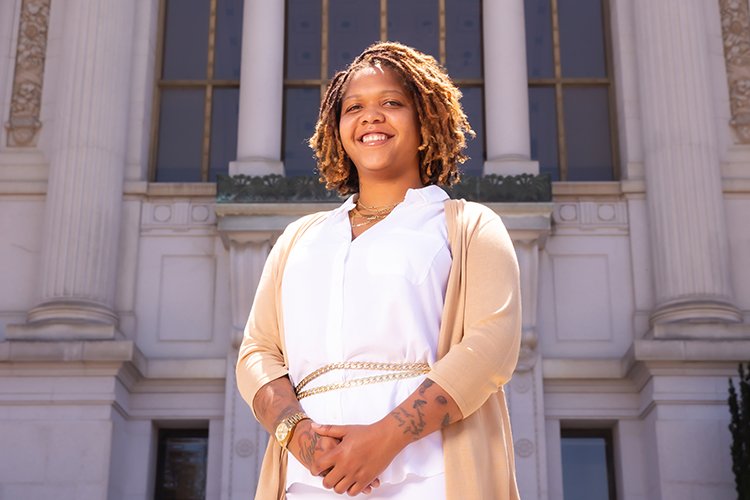In an eye-opening Social Justice Speaker Series talk on Nov. 20 at Diablo Valley College, Shani Shay, director of the Incarceration to College program at UC Berkeley, passionately addressed the need to dismantle the school-to-prison pipeline using innovative educational approaches.
The discussion, which took place in the Diablo Room and was broadcast online, focused on Shay’s personal story and her mission to further the educational aspirations of in-custody and marginalized youth through the use of Black Feminist Pedagogies.
As a graduate of UC Berkeley herself and the founder of Incarceration to College and Pathways to College, Shay provides hands-on fieldwork experience for Berkeley students, advocating for the rights of incarcerated individuals and disrupting the pervasive cycle of incarceration.
Shay’s journey began with her own encounters in the criminal justice system at the age of 18, which she said gave her a unique perspective on the challenges faced by those entangled in the school-to-prison pipeline. After felony probation, Shay became a Firebaugh Scholar at UC Berkeley, which launched her quest for effective teaching methods for incarcerated youth.
During last week’s talk, Shay highlighted a number of alarming statistics related to imprisonment — like the fact that about 1.8 million people are currently incarcerated in the U.S., making it the highest incarceration rate globally. According to Shay, within five years of their release, 70 percent of prisoners are likely to be rearrested.
Shay emphasized the need for systemic change and stressed the importance of “education as a tool for liberation.” As it currently stands, she said, “the system doesn’t work.”
She underscored the especially detrimental impact of incarceration on youth, which increases the risk of death and suicide as well as physical and sexual violence among that population. Shay pointed out that 60 percent of incarcerated youth have Individualized Education Programs (IEPs) or are identified as disabled, highlighting the vulnerability of this demographic.
The heart of Shay’s advocacy lies in her use of what she called Black Feminist Pedagogies, a teaching approach developed by the Combahee River Collective. The methodology aims to promote equality and multiple perspectives, challenging the exclusivity and chauvinism inherent in the Western intellectual tradition.
Additionally, Shay introduced the concept of Fugitive Pedagogies, developed by Dr. Jarvis Givens, as a means for marginalized communities to navigate and resist traditional oppressive educational systems.
In her closing remarks, Shay urged the audience to reconsider existing educational paradigms and embrace pedagogies that recognize the humanity and potential of all students, particularly those at risk of being ensnared in the school-to-prison pipeline.
Shay’s talk served as a poignant call to action for educators, policymakers and community members to unite and create a more equitable and just educational system.





































































